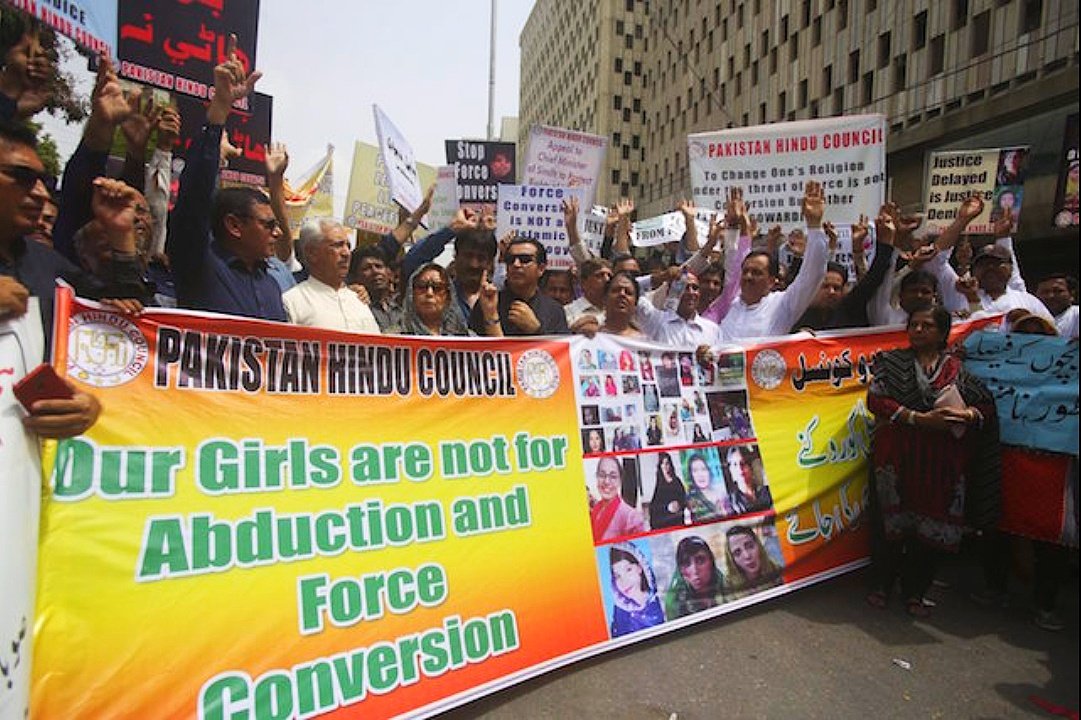New Delhi: Despite claims made by Pakistan otherwise, persecution of Hindus in this country is no secret. The dwindling numbers of minority communities since the formation of the Muslim state are self-explanatory as to how Pakistan treats its citizens practicing religions other than Islam. Forced conversions, hate crimes, atrocities towards women are some of the tools employed by Pakistan to ensure that no Hindu can live in peace and with dignity in this rogue country.
Hindus account for 4.5 million, or more than 2 percent, of Pakistan’s population, according to census data, with most of them living in Sindh Province, which has long been seen as the country’s religious melting pot. Approximately 1,000 Hindu and other minority girls in Pakistan are kidnapped and converted to Islam every year. These girls are kidnapped and are often forced to marry men twice their age, raped, sold into human trafficking rings, or forced into prostitution. Some Islamic seminaries teach that forcibly converting Hindu girls is equivalent to the greatest religious duty for a Muslim.
Between 2004 and 2018, there were 7,430 reported cases of kidnappings of Hindu girls in the Sindh province alone, while the actual number of cases is estimated to be much higher. Most of the targets are Hindu and Christian girls from lower Castes and poor families. Some notorious religious establishments proudly validate these alleged crimes. According to Pakistan’s 2017 Universal Periodic Review to the UN Office of the United Nations High Commissioner for Human Rights (OHCHR), an average 20 of Hindu girls are abducted every month in Pakistan, converted by force to Islam, and then married off to their abductors.
Within Pakistan, the province of Sindh had over 1,000 forced conversions of Christian and Hindu girls according to the annual report of the Human Rights Commission of Pakistan in 2018. According to victims’ families and activists, Mian Abdul Haq, who is a local political and religious leader in Sindh, has been accused of being responsible for forced conversions of girls within the province. More than 100 Hindus in Sindh converted to Islam in June 2020 to escape discrimination and economic pressures.
The Pakistan constitution only in theory guarantees religious freedom to all of its citizens under Articles 20-22. However, Islamic law introduced in 1977 imposes regulations and injunctions that deny equal protection and religious freedom to non-Muslims. The blasphemy laws stated in Pakistan’s Penal Code (Sections 295B and C, and 298A-C), impose severe punishments for perceived insults to the Prophet Mohammed or desecration of the Quran. Numerous high-profile cases are centered on the Dargah Bharchundi Sharif seminary, where Sajjada Nashin (Caretaker of Dargah) insists that young Hindus embrace Islam.
In 2010, a Pakistani Christian woman, Aasiya Noreen, commonly known as Asia Bibi, was convicted of blasphemy by a Pakistani court and was sentenced to death by hanging. In October 2018, the Supreme Court of Pakistan acquitted her based on insufficient evidence, though she was not allowed to leave Pakistan until the verdict was reviewed. She was held under armed guard and was not able to leave the country until 7 May 2019 after which she left for Canada.
[Disclaimer: The opinions, beliefs, and views expressed by various authors and forum participants on this website are personal.]










